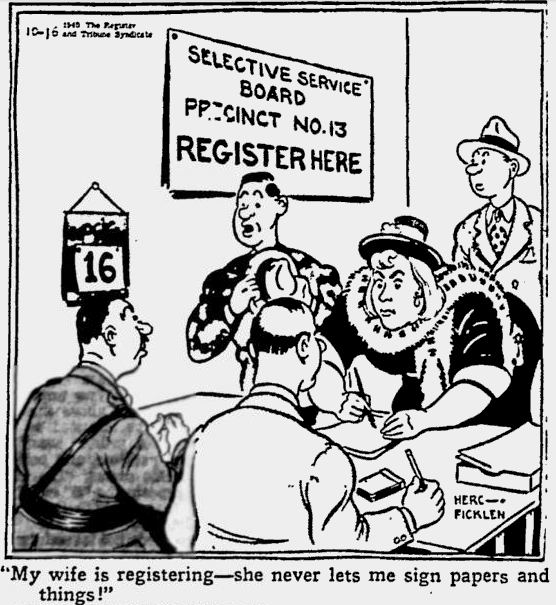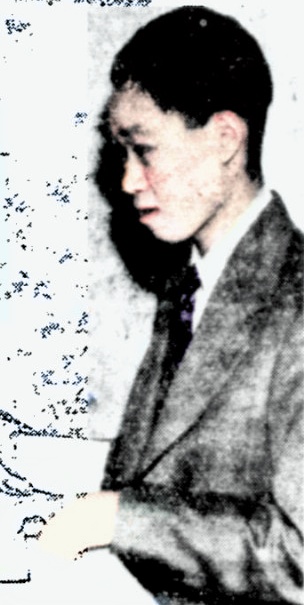The Pittsburgh Press (October 16, 1940)
DISTRICT BOARDS RUSHED, HUNDREDS STAND IN LINES
…
Downtown, North Side and Mill Places Get Bulk of Early Enrollees
…
U.S. MANHOOD ANSWERS CALL
By Lyle C. Wilson, United Press Staff Writer
New York, Oct. 16 –
First call, and millions answer.
All day America’s young manhood is marching. They’re a little out of step, but not for long.
Zero hour moves westward with the sun and 16,404,000 strong they register for national service.
East side, west side, Main Street, farm; town hall firehouse, village barn – the young men gather to fulfill their responsibility to America.
President Roosevelt tells them:
Democracy is your cause – the cause of youth.
Zero Hour Speeds West
7 a.m. and they are lined up and waiting in the East. Another hour, another time zone, and the Mississippi Valley is offering up its youth. Through the Mountain States the zero hour is moving, up and over and down the Pacific slope.
The machinery of national Selective Service is spinning coast-to-coast, Gulf-to-Canada. The world around us is on fire.
This is the traditional American muster done to greater scale. But the muster, all the same, that enabled western pioneers to hold the plains states and the New Englanders before them to meet the Indian’s charge. America is mobilizing for defense. The President emphasized that.
Rich and Poor Alike
Here they come, there they go – a million or more an hour for the national army of defense – all males, 21 to 36 years old inclusive.
All males – that is the way of democracy. The high and low, rich and poor, good and bad. The Rockefeller boys and the sons of their older servants. Bobby Feller signs on with a shotgun in the crook of his arm. Bobby’s going hunting and if the draft gets him, okay. Tough, though, for the Cleveland ball club.
Hour by hour, the lines form at 125,000 places of registration. It won’t be long, now, Johnny, if you are fit and free.
It Happen Here
October 16, 1940 – America at peace registers its young manpower for compulsory military service. It is happening here.
comparatively few exempt because of their membership in or association with the armed services or who are on an otherwise strictly limited essential list.
There are 11 questions and the man gets a card. His card later gets a number and some 900,000 of those numbers will call for guns. There are about 3,280,000 of those young men who are on the march today who will be fit and available – no dependents, no essential job. The first 900,000 are among them somewhere as they come today from field and factory, cities and towns.
Dissenters Few
7 a.m. in the East. The nation’s greatest city puts 1,107,000 of its young men on the registration line. Town halls and fire houses are open in New England. They are giving their names – addresses – ages – in school houses in New York. The Atlantic Seaboard is signing up and this first segment of the registration extends instantaneously south and westward to the flatlands of Indiana.
The nation’s greatest peacetime army is being born and no one knows whether he or the next man will be in it. “Today’s the day,” they say.
There are little blobs of dissent. A teacher here, a parson there cannot reconcile conscience to assist the draft. Some young students – so young – feel that they cannot conscientiously give their names despite assured deferment.
17 hours overall and the job will be done.
‘Cross Roads of Destiny’
7 a.m. to 9 p.m. is the span and the Pacific Coast will be marching for three hours after all is finished in the East.
Military service is the destination of the fit. Intelligent leadership, comfortable clothing, good food and adequate arms is the government’s part of the bargain. Acceptance of a fundamental obligation of citizenship is the registrant’s contribution.
President Roosevelt said:
America stands at the crossroads of its destiny.
The class of October 16, 1940, is signing on to protect her there.
The method is fair, it is sure, it is democratic – it is the will of people.
‘Not for War,’ Willkie Says
Wendell L. Willkie talks, too. That was last night but they may read today, and he tells them.
To every man in the course of his life come a few – a very few – impressively solemn moments. Such a moment comes when a man outs his life at the service of his country.
This is not for war, we must avoid it if we can.
What I would ask of you is that you form yourselves into an army – the best and most efficient army on earth.
Johnny, get your gun!
Here in America we still have freedom. It is here and here alone. And if we do not guard it – with our lives if necessary – it will perish from the earth.
Candidates In Agreement
No dispute at the top over this registration. Both of those men are for it.
At 7 a.m. from fields and factories, from penthouses and hobo jungles, from shanty-towns and the halls of Congress came the vanguard of men who must register before 9 p.m. The first step in building up over the next five years a reservoir of nearly five million trained men.
They started answering 11 pertinent questions put to them by more than a million volunteer workers in 125,000 registration places scattered throughout the country.
Few Exceptions
With a few specific exceptions, the Registration Law touched every draft-age man in the country – rich and poor; movie star and WPA worker; white, black and yellow; citizen and alien; minister, priest and rabbi; the sound of body and the lame, the halt and the blind.
Only ones exempt from registration were members of the armed forces, the Reserves, Public Health Service, Coast Guard, Coast and Geodetic Survey employees and members of the diplomatic corps.
R-Day was not proclaimed a national holiday. In most states, however, school holidays were declared. Employers were asked to see that their employees not only know that they must register, but that they be given sufficient time off to do so. The government set an example by giving all employees three and a half hours off – without loss of pay or annual leave.
Certificates Necessary
No delay in registering was anticipated except in the most crowded metropolitan areas. The average of paper work was 16.5 registrants for each registrar for the 14-hour day. An average of 20 minutes to fill out each card was anticipated, but officials said that an intelligent registrar could register an equally apt registrant in about five minutes.
All registrants were warned to insist upon a registration certificate. Officials throughout the country were expected to start demanding a show of the registration card by every person of draft age at every opportunity.
The registration card, which will be filled out and kept by the registrars, will be sent to the local draft boards which will shuffle them like a deck of cards, number them from the top and assign each a “serial number.” The number will be used by national headquarters in the lottery to determine the order in which registrants shall be classified for military service.
Lottery Oct. 29 Likely
Each local board will prepare and post in a public place a master sheet of registrants. It will carry the name and address of each registrant and his registration serial number.
Selective Service officials predicted that the lottery would be held between October 26 and November 2 with October 29 as the most probably date.
The conscription law was introduced last June. The Administration did not endorse the bill officially until August, when Mr. Roosevelt urged haste in its passage. By that time, Congress had authorized cast sums for mechanical preparedness and the President pointed out the need of trained men for those machines.
Even with passage, the machinery was set up gradually. Only last Monday did Mr. Roosevelt nominate Clarence A. Dykstra, president of the University of Wisconsin, to the $10,000 a year post of director. The nomination was confirmed yesterday.
YOU’LL NEVER GET RICH! — By Ficklen

